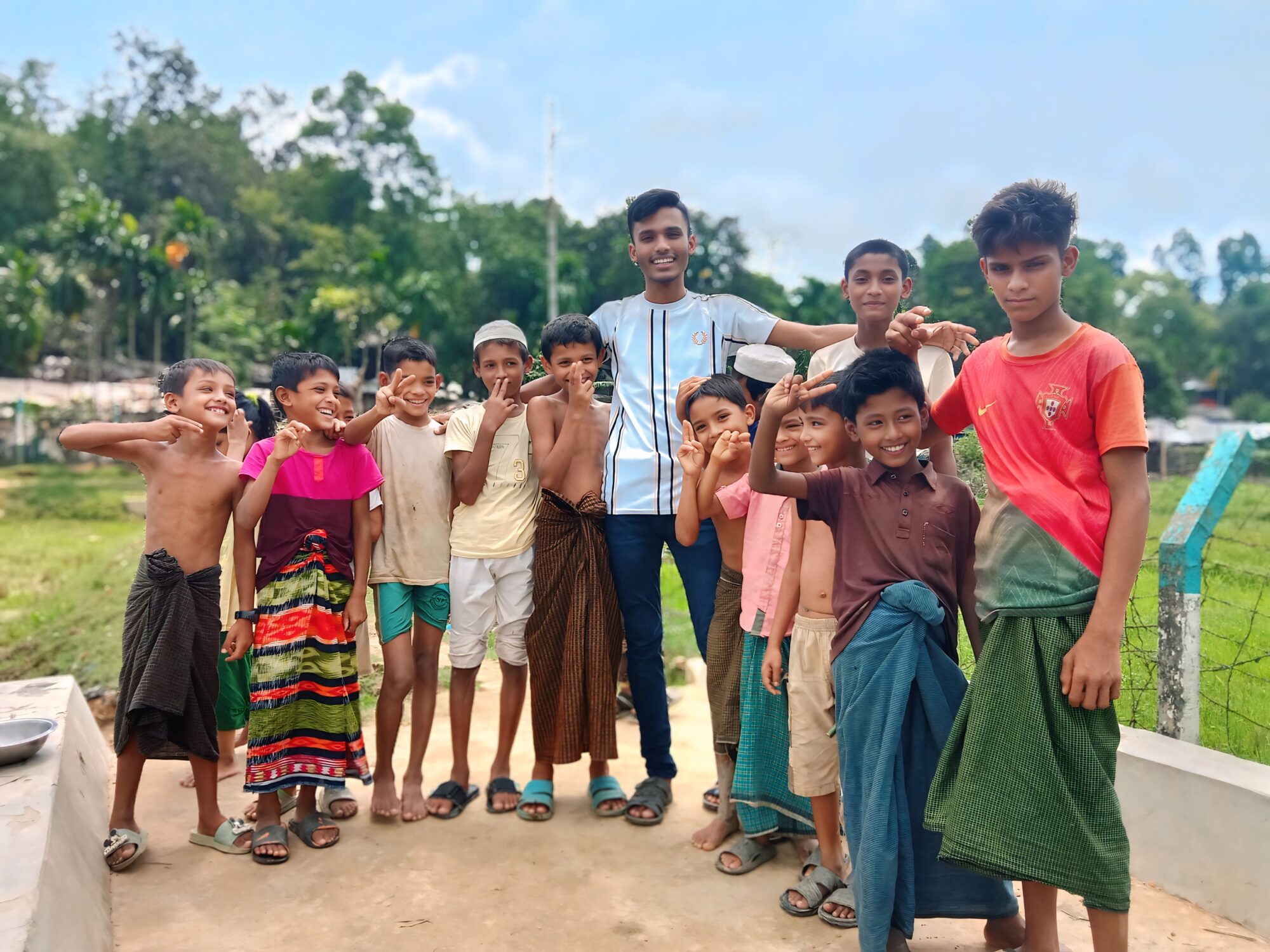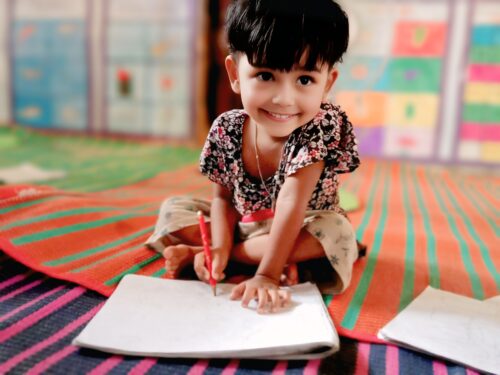Where I live is like a jail, but it isn’t a jail. More than one million Rohingya people live in the refugee camp in Cox’s Bazar, Bangladesh. This is the place we have called home for the past eight years.
Can you imagine the lives of the children here who don’t have access to a formal education system? Can you imagine their future in this digital age without education? They are living in limbo. I want to ask the global community, the United Nations, and every human rights defender: Where is your voice when girls are told that books are not for them? Where is your support when thousands of children are out of school?
I have never had the chance to attend a formal school like other children around the world. I tried to learn from people, from books, from the small opportunities that came my way. But this is not just my story. It is the story of hundreds of thousands of school-aged boys and girls in the camps, who wake up every day dreaming of studies, a teacher, and a future they deserve.
Even in this silence, hope has not disappeared for us. Amid the bamboo shelters and barbed-wire fences around the camps, we continue to raise our voices through writing, teaching, volunteering and dreaming bigger. Education may be locked away, but our determination is not. We will continue to remind the world that education is not a privilege – it is a right. For that right, we are still waiting in these dire circumstances.
“Education is more than a right – it’s our lifeline as refugees”
Some Rohingya children study in community-led schools, run by the refugees themselves. Their families have to pay for their places and for the materials that they need. These community-led schools lack enough books, the teachers aren’t always fully trained, and there are no facilities to help keep the students cool in the hot season. There are also learning centres funded by NGOs, such as Unicef, but they only provide primary education, there are not enough centres to provide education for all of the children in the camp.
Monjur Alam, a 16-year-old student from the camp, attends one of the community-led schools. He said: “I enjoy going to school because I can study with classmates, meet new friends and make lifelong friendships. Education is the most powerful thing I know to change my life from a refugee.” Many talented young people like Monjur see education as the only pathway to get out of darkness – a path to a better life.
Nazim Ullah, 18, said: “Education shows me the world. Without it, life feels like a body with no legs or eyes.” He dreams of bringing education to the entire Rohingya community and working with refugees worldwide. He said: “If I want to change my community, first I need to change myself by getting a quality education from reputable institutions. I hope this dream will come true one day. I am eagerly waiting for this opportunity.”
“We don’t have umbrellas, so walking to school in the sun and monsoon is very hard,” Monjur adds. Others speak about noise at home due to densely populated shelters and the lack of internet access in most places.

Parents also carry heavy worries. One mother, Amina Khatun, said: “I want my daughter to learn, but sometimes we can’t afford the small costs – pens, notebooks, clothes. We want more for our children, but we feel helpless.”
Teachers in the refugee camps work hard, often with little support. Mohammed Alamgir, who teaches youths aged from 15-24, shared: “We try our best to teach with limited materials. Some of us are trained, some are not. But we continue because we believe in the power of education.”
Another teacher, Anowar Shah, said: “The biggest challenge is not only teaching but keeping students motivated when they face so many problems outside the classroom – hunger, trauma, family pressure, or no clear future.”
One teacher, who wished to remain anonymous, said: “I am a refugee too. I understand their pain because I live it every day with them, feeling like them. Sometimes I teach in a place that does not look like a classroom, without the books that we need, even without light at night, just with candles. But I still come, because if I give up, who will teach them?”
“We try our best to teach with limited materials. Some of us are trained, some are not. But we continue because we believe in the power of education”
Another teacher, who also wished to remain anonymous, shared: “It’s not just about lessons. These children come to school carrying so much sadness and trauma. Some are hungry, some have lost their parents, and some have never seen a real school in their lives. I try to make the classroom a place of hope.”
Despite the lack of support, many teachers are continuing to teach with love and resilience, holding on to the belief that even one educated child can change the future of the Rohingya refugee people.
Today, the struggle is even harder. Major funding cuts meant that in June 2025, Unicef had to shut most of the learning centres that it ran for nearly 230,000 Rohingya children, and it terminated the contracts of 1,179 volunteer teachers. Human Rights Watch, an NGO, says there are 437,000 school-age Rohingya refugees, and that the funding cuts have “worsened the existing education crisis”.
Many children now face risks like child labour, early marriage, and even trafficking. In a statement, Unicef said: “Learning facilities are not just about lessons; they are a vital line of protection. School closures don’t just disrupt learning – they put children at real risk. With nowhere safe to go, children – especially adolescent girls and boys – are more vulnerable to recruitment by armed groups, exploitation, early marriage, and violence.”
At the end of July, as this article was finalised, Unicef confirmed that most of the learning centres in Cox’s Bazar remained closed and would remain so until new funding was secured.
“Learning facilities are not just about lessons; they are a vital line of protection”
Despite all this, Rohingya youth continue to dream. Barek Hussain, a 17-year-old student, said: “I want to get a good job and help my family and community.” Mohammed Arfath, a 19-year-old student, dreams of becoming an artist and researcher.
Even when they feel like giving up, they find reasons to go on. “Sometimes I feel low,” says Barek, “but I remember my goals and the people who believe in me. That gives me the strength to move ahead.”
These words – “Even then, we do not give up” – mean everything to Rohingya youth. No matter how hard life gets in the camps, they don’t stop hoping. They don’t stop hoping, even when schools are closed or support is missing. They dream of becoming teachers, artists, doctors, or leaders – not just for themselves, but to help their families and communities.
Nazim said it best: “Giving up is not the solution. I will continue again and again.”

Rohingya children deserve more than temporary classrooms. They need formal education, qualified teachers, enough learning materials, and the chance to study beyond basic levels. Girls especially need safe and supportive spaces to learn, free from fear of harassment, family pressure, helping with household work, and early marriage.
One parent, Mabiya Khatun, said: “We just want our children to have what others have – a real school, a future.” Student Hafiz Ullah says: “Education is more than a right – it’s our lifeline as refugees. Without it, my generation may grow up with no skills and no future. I want to speak up for all Rohingya children who are losing their chance to learn. Through this story, I hope the world will listen and support long-term education for our community.”
Rohingya children deserve more than temporary classrooms. We were born without a country. We are also living without peace and freedom. But we still believe, with books in our hands and hope in our hearts. Every child here wants to learn, to dream, and to be seen as a human.
Please don’t forget us.
